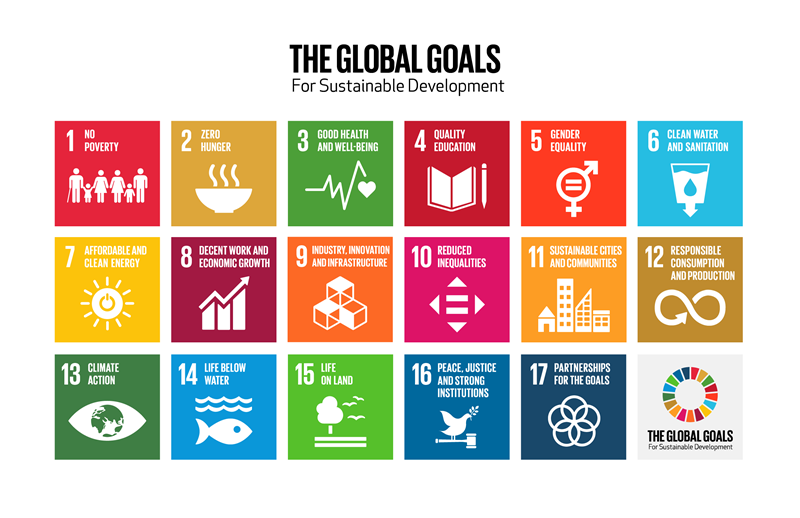Global Goals: It’s halftime!
18 Sep 23

It’s halftime. It’s been a tough first half. But hope remains! Because it’s halftime, there is still enough time and opportunity to make an impact and perhaps even realise the dream.
Before you read on, you should know that this is not a game. It’s bigger than that. This is about the Sustainable Development Goals and how achieving them will change the world for us all.
17 goals for everyone, everywhere
The Sustainable Development Goals (SDGs), also called the Global Goals, are at the heart of the 2030 Agenda for Sustainable Development, adopted by 193 world leaders at the United Nations General Assembly in 2015.
The Global Goals are universal: they are for everyone, everywhere. The 17 Goals and their 169 Targets aim to promote and achieve action for the peace, freedom and prosperity of all people and the planet.
Ending poverty and hunger are key priorities. Fostering peaceful, just and inclusive societies is also critical. As the UN’s 2030 Agenda states, “There can be no sustainable development without peace and no peace without sustainable development.”
UN data shows some progress, for example towards the goal of good health and well-being (Goal 3), with “146 out of 200 countries or areas have already met or are on track to meet the SDG target on under-5 mortality” and “effective HIV treatment has cut global AIDS-related deaths by 52 per cent since 2010”. Access to clean water and sanitation (Goal 6) has also improved in rural areas, with more of the world’s population – an additional 687 million people since 2015 – now having access to safely managed drinking water.
But, as the UN’s 2023 The Sustainable Development Goals Report states, “it is clear now that too much of that progress was fragile and too slow... It is time to sound the alarm.”
The good news
The United Nations General Assembly will gather for its own halftime talk, the 2023 SDG Summit, on 18-19 September in New York. World leaders will gather with leading thinkers in areas of politics, governance, civil society, public service and private sector, as well as women, young people and key representatives to discuss next steps.
The timing marks the halftime point between 2015 (the year the Global Goals were adopted) and 2030 (the year by which they are to be achieved).
The UN Office for Partnerships’ Halftime Campaign makes it clear that, while the challenge is ahead of us, success is still possible.
“Seven years in, we are at the halfway mark of the SDGs but we are down at Halftime with only 15% of the Goals on track. The good news is that any match is won in the second half. We have the knowledge and know-how to secure a life of dignity for all on a healthy planet.” UN Office for Partnerships
#ImagineWinning
The Global Goals are still in reach and, given the widespread need, there really is everything to play for. The United Nations Office for Partnerships proposes that “what we need now is to regroup, re-energize, recommit, and #ImagineWinning”.
Can you imagine a world where there is (to name a few SDGs): no poverty (Goal 1)? zero hunger (Goal 2)? quality education for all (Goal 4)? climate action (Goal 13)? peace, justice and strong institutions (Goal 16)?
To achieve the Global Goals, we will need the kind of belief that helped Ted Lasso’s team win but we’ll also need the depth of courage, partnership and determination that agencies like Caritas Australia and its partners demonstrate in their work with and for the world’s most vulnerable, at risk and/or marginalised people.
Partnership at work
Caritas Australia’s mission in development is driven by its values of courage, compassion, stewardship and partnership. Our work is also shaped by Catholic Social Teaching, including the principles of Human Dignity, The Common Good and Solidarity.
With your generous support of our Women for the World campaign, we are working towards a world with no poverty (Goal 1) by accompanying our Australian and international program partners as they help the estimated 388 women and girls living in extreme poverty worldwide to transform their lives.
By mobilising and accompanying Catholic schools, parishes, organisations and households through climate change advocacy and our Catholic Earthcare program, we are already seeing the transformative potential of climate action (Goal 13).
Through the global Caritas Internationalis network, we can direct and deliver humanitarian aid (for example, clean water and sanitation (Goal 6)), when and where it is most urgently needed. Appeals following the recent devastating Morocco earthquake and Libya floods demonstrate just how critical this kind of immediate support is for communities experiencing vulnerability.
Join us
Play your part in achieving the Sustainable Development Goals! Learn more via our range of SDG-focused justice education resources. Support Caritas Australia, joining us in our work to 'end poverty, promote justice, uphold dignity’.